Sorted by date Results 1 - 25 of 84

Lynyrd Skynyrd expressed the mood of much of the country when it questioned the relevance of Watergate and the feigned outrage surrounding a third‑rate burglary that captured the nation's attention. More than half a century later- 54 years after the break‑in and 52 years after the release of Sweet Home Alabama - Watergate has become civic shorthand for presidential corruption. The burglary at the Democratic National Committee headquarters and the subsequent cover‑up are treated as the original s...
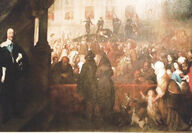
Four hundred years ago, Charles I was crowned King of England. He became king automatically upon the death of his father, James I, but his coronation was delayed for almost a year. Officially, the delay was attributed to an outbreak of plague which made public gatherings deadly when, in truth, the excuse masked another reality. Charles was broke. His father had spent lavishly and left the crown deeply in debt. Along with the throne, Charles inherited the existing financial obligations and a stra...

Four hundred years ago, Charles I was crowned King of England. He became king automatically upon the death of his father, James I, but his coronation was delayed for almost a year. Officially, the delay was attributed to an outbreak of plague which made public gatherings deadly when, in truth, the excuse masked another reality. Charles was broke. His father had spent lavishly and left the crown deeply in debt. Along with the throne, Charles inherited the existing financial obligations and a...
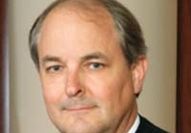
One Hundred Fifty years ago, a small business in Pittsburgh filed for bankruptcy protection. The H.J. Heinz Company was forced to take this action when the national economy soured, its contractual obligations were over extended, and the company could not pay its debts. This public humiliation could have marked the end of the company and curtailed the entrepreneurial spirit of Mr. Heinz, but in many ways, the bankruptcy became a catalyst to work even harder to re-build and prove a point by...
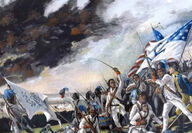
In 1776 - 250 years ago - General George Washington made a decision that was both pragmatic and radical for its time when he integrated the Continental Army, allowing free Black men and later some formerly enslaved men to serve alongside white soldiers. But rather than being driven by enlightened ideas or progressive principles, Washington's command decision reflected practical military necessity, political calculation, and an evolving understanding of liberty. Before the Revolution, Black milit...

Imagine going to visit a relative in another country and discovering they had things that your own country did not. Not only were goods available for sale, but varieties of food were offered at fair and reasonable prices. People seemed happier in their jobs, and there was a certain vibrancy throughout all strata of society as they enjoyed more autonomy and freedom of movement. Government was less intrusive and more in the background. Law enforcement was more partner than adversary. Imagine furth...

In fact, while a few other countries have a national day for prayer or thankfulness, nothing truly resembles our Thanksgiving Day. Europe, with its more established countries, scoffs at such a notion of commemorating the virtue or emotion of thanksgiving. They might celebrate national accomplishments like successful harvests, vanquishing enemies, and religious observations. A day for thanksgiving related to the passing of a particular calamity might occur every now and again, but having an...
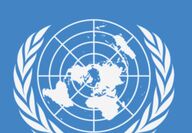
We are increasingly embroiled in an age in which the truth is an unwanted and uninvited guest. Leaders, especially in the body politic, have no desire to find the truth, because in finding it, they might have to change, resulting in dire consequences to the longevity of their public service, if not to their constituencies. The machinations of the United Nations is perhaps the best example of how truth becomes lost in the ideological shuffle. The U.N. was founded to promote peace among nations...

One hundred years ago this month, the Ford Motor Company produced 10,000 Model T cars in one day. That level of production for one specific car would never be matched as production lines added new models to inventory, but this output in 1925 would validate the theories of Adam Smith that specialties of labor in production would efficiently produce more of a product at a lower per unit cost. Smith hard argued 150 years earlier that efficiencies could be realized when a manufacturing process was...
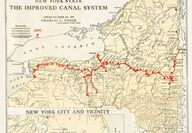
Two hundred years ago, the Erie Canal was finally completed, and to celebrate the achievement the Governor of New York and other local elected officials engaged in a progressive celebration. They sailed from Lake Erie to New York Harbor with stops at communities along the way. It was like a 10-day tailgate with parties, speeches and all-day public celebrations, and it culminated in a ceremonial “wedding of the waters” when water from Lake Erie was poured into New York Harbor. The completion of t...

World War II ended 80 years ago. But, before any peace dividend could be paid or the euphoria fully experienced, the Cold War started. Victory in the total defeat of the Third Reich and the Empire of Japan failed to usher in a new world order for peace, prosperity or universal rights. To the Russians, the defeat of the Nazis was not an end, but an opportunity to assert itself and insert an ideology that used peace as an opportunity for conquest. This shocked many in the West who believed Stalin...

No one presided over its funeral, but vestiges of antisemitism died suddenly here, and no one missed its pernicious influence. Segregation based on race was an overt policy for years, but segregation on the basis of faith was a subtle form of discrimination, permeating through our political institutions for years. Its subtlety masked its effect, and its virtually unwritten code prevented our Jewish friends and neighbors from fully assimilating into our social and political communities. When the...

In the not-so-distant past, the United States’ relationship with the Soviet Union was best summed up by the policy of containment. The idea was very simple — communism in general and the Soviet Union in particular were menaces to the world order. Communism could be dealt with intellectually, but once the Soviet Union began to aggressively export its version of communism by forcing itself on neighboring countries, something had to be done to stop the expansion. After World War II, the U.S. had...

Three Hundred years ago this month, in a dockside community in the East End of London, John Newton was born. Following in his father's footsteps, he would become one of the hordes of Englishmen who “go down to the sea in ships.” Initially, he served on a commercial vessel, but while at port, he was “pressed” into service, or basically kidnapped, by the Royal Navy. The brutality of naval service was difficult, and Newton deserted his ship only to be captured and severely beaten in front of the...

Before the Declaration of Independence, there was the Olive Branch Petition. Written 250 years ago today, the Olive Branch Petition was Thomas Jefferson’s first attempt to explain to King George III why the American Colonies were rebelling and ask for reconciliation. The “Shot heard ‘round the world” had been fired almost three months earlier, and the Battle of Bunker Hill had just ended. It was readily apparent to the Second Continental Congress that the situation was spinning out of control...

That great standard of liberty, the Magna Carta, is 810 years old this month. Historians and political scientists have examined its provisions extensively, carefully allocating each clause to various rights and freedoms we now take for granted. Indeed, it is a fascinating inquiry to consider that so many centuries ago, various rights now considered standard and common were first tested in the body politic. Many refer to the United States as an experiment because our Constitution created a form...

World War II ended in Europe 80 years ago, but without obtaining its stated objective. The cause of the war — the sovereignty, territorial integrity and independence of Poland — went unrealized. Poland had merely traded Nazi occupation for Russian domination. For all the high-minded conjecture about a safer, more secure world, the fate of Poland was completely lost in the shuffle. The future peace and stability of a new world order sacrificed Poland to the Soviet sphere of influence. Even bef...
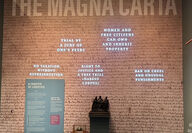
That great standard of liberty, the Magna Carta, is 810 years old this month. Historians and political scientists have examined its provisions extensively, carefully allocating each clause to various rights and freedoms we now take for granted. Indeed, it is a fascinating inquiry to consider that so many centuries ago, various rights now considered standard and common were first tested in the body politic. Many refer to the United States as an experiment because our Constitution created a form...
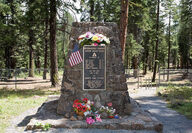
There is only one place on the continental United States where enemy action killed American citizens. 80 years ago in Bly, Oregon, 5 people died when a Japanese bomb exploded. The bomb had been sent over by a balloon to cause indiscriminate damage and loss of life. America's mainland has generally been spared the destruction of war that has ravaged so many countries in the last century. Until September 11, offensive attacks on the United States mainland were limited to sabotage efforts executed...
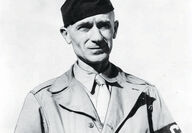
One of America’s most famous combat correspondents was killed 80 years ago on the island of Ie Shima in Japan. Pulitzer Prize winner Ernie Pyle died when a burst of enemy machine gun struck him in the head. His death was mourned throughout the country, from President Harry Truman to Eleanor Roosevelt to General Eisenhower to the masses of infantrymen Pyle wrote about throughout the war. He was a journalist of the old school, providing the facts from his experience embedded with combat troops and...

World War II ended in Europe 80 years ago, but without obtaining its stated objective. The cause of the war — the sovereignty, territorial integrity and independence of Poland — went unrealized. Poland had merely traded Nazi occupation for Russian domination. For all the high-minded conjecture about a safer, more secure world, the fate of Poland was completely lost in the shuffle. The future peace and stability of a new world order sacrificed Poland to the Soviet sphere of influence. Even bef...
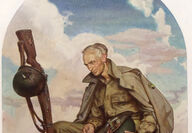
One of America's most famous combat correspondents was killed 80 years ago on the island of Ie Shima in Japan. Pulitzer Prize winner Ernie Pyle died when a burst of enemy machine gun struck him in the head. His death was mourned throughout the country, from President Harry Truman to Eleanor Roosevelt to General Eisenhower to the masses of infantrymen Pyle wrote about throughout the war. He was a journalist of the old school, providing the facts from his experience embedded with combat troops and...

Two hundred years ago, the Marquis de Lafayette spent nine days in Alabama traveling across the midwestern portion of the state from Georgia to Montgomery and then to Selma, the Capitol at Cahawba, and downriver to Mobile. Alabamians came out of the woodwork to see him; Lafayette drew crowds that any politician or public figure would envy. But what prompted his visit and why is it being commemorated with such veneration today? At age 19, Lafayette came to America to join the colonies in...

King James of England was rather unremarkable so at his death 400 years ago, only his retainers and courtesans grieved his loss, and most assumed his historical legacy was limited. His memory today would likely be little more than a footnote except for the one thing that would make any marketing director green with envy for product placement —the King James Bible; the Royally authorized translation of the Holy Scriptures. In James’s case, this contribution was substantial, and he deserves cre...

All beginnings are hopeful, but 50 years ago the future of the Conservative Party in Great Britain was dismal. Their leader, Edward Heath, had managed to lose two general elections in a single year-- far from an auspicious beginning. Sensing rumblings among his fellow Conservatives in Parliament, Heath decided to confirm his position as party leader, and to do this, he would convene the party and hold an election. His assumption was that the malcontents would have an opportunity to put up or...